A brief history of Olympic dissent: The pre-war years 1900-1912
Hosting the Olympic Games in the People's Republic of China has put the spotlight on China's human rights and environmental record, and there have been some calls for the games to be boycotted. It seems that even from the start of the modern Olympics in 1896, the games have found themselves inevitably entwined with politics, protest, and dissent.
Yesterday I wrote about how the Greek hosts in 1896 used the opportunity to boost national pride, but also how one Greek woman ran a solo marathon to prove that her sex should be able to join in the competition. During the series of games held from 1900 until the outbreak of World War I, almost all of them featured some form of protest or dissent.
Paris in 1900
Much of the conflict surrounding the 1900 games wasn't about world politics, but more about the politics of sports administration in France. When Pierre de Coubertin founded the modern Olympic Movement in 1894, the aim had always been to host the 1900 Olympics in Paris to coincide with the planned Universal Exposition.
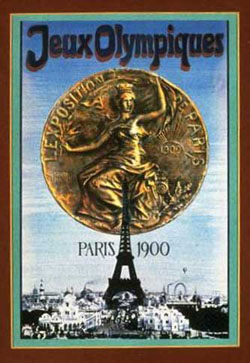
Following the success of the 1896 games in Athens, that plan seemed sensible - until the organisers of the Exposition stepped in. They insisted that if any sports event were planned to accompany the Expo, then they should organise them, not the Olympic committee. The result was that the original programme was scrapped, and replaced by five months worth of sporting events, many of which were not described as 'Olympic' at the time - the phrase "Concours Internationaux d'exercises physiques et de sport" was preferred and used on posters.
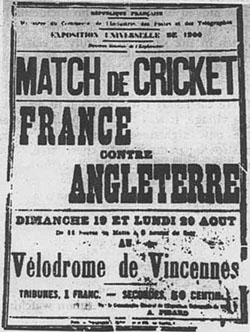
Bizarrely, that even included the only official Olympic cricket match. It seems to have been played by a touring English amateur side that happened to be visiting France, and some ex-pat cricket enthusiasts based near Paris who represented the hosts. The match was held at the Velodrome de Vincennes.
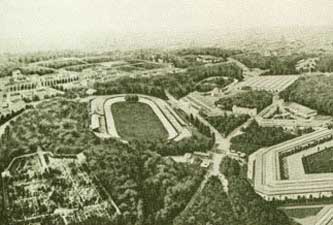
If animal rights activists had been around at the turn of the 20th century, I'm sure they would have been protesting. The 1900 Olympics also featured the only Olympic appearance of live pigeon shooting as a sport.
There were some protests at the games amongst the athletes however. Some of the sporting action was scheduled for Sundays, and many thought it inappropriate to be competing on the Christian Sabbath. Indeed, it appears that one competitor, Myer Prinstein, was told by his college he could not take part in a final on a religious day of observance. He forfeited the chance of a gold medal as a result, and in his frustration allegedly punched his opponent in the face - which doesn't seem a particularly pious thing to do!
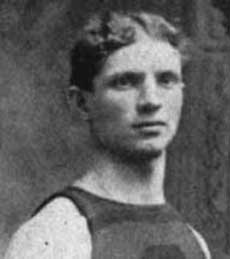
St. Louis in 1904
Much the same problem afflicted the 1904 edition of the games. Originally due to be hosted in Chicago, the organisers of a simultaneous Expo in St. Louis planned their own rival international sporting event. The Olympic committee prevented the clash by moving the Olympic Games to St. Louis. Again, rather than the concentrated burst of sport we know today, the games were prolonged over a four month period.
The marathon race descended into a farce worthy of the Keystone Cops. The win was initially awarded to someone who had only completed 9 miles of the course and given up, and was simply returning to the stadium to pick up their kit. Another competitor fell ill after eating rotten apples, and two black Africans who were part of the 'Boer War' exhibition at the Expo entered and finished a creditable 9th and 12th despite being chased by dogs. The eventual official winner, Tom Hicks, had to be helped over the line after being given medical brandy to revive him in the heat.
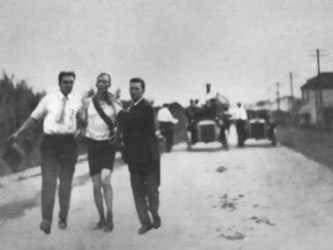
Before widespread air travel the expense of getting to the USA discouraged many competitors, and only 12 nations sent athletes. The entrant count was heavily favourable to the States - of the 630 involved, 523 were representing the host nation. Unsurprisingly, the USA romped home top of the medal table - taking 242 of the 283 awarded.
The 1906 Intercalated Games in Athens
The 1906 Games have subsequently been downgraded to a 'celebration' by the IOC. The original idea was that every four years, between international Olympics, Athens would host a contest. I wrote about the 1906 Games earlier this year, and the biggest political dispute was Irish athlete Peter O'Connor objecting to being placed in the British team, and climbing the flagpole at his medal ceremony to wave an Irish flag.
London in 1908
I also wrote about the 1908 Games earlier this year, on the centenary of their opening. The most notable political protests revolved around the display of flags at the opening ceremony. The tradition that the American flag is not dipped to a foreign head of state at the Olympics started in White City, not as a considered philosophical decision, but as retaliation for the fact that the organisers had forgotten to include the Stars'n'Stripes in the line-up of national flags.
Another flag dispute saw the Finnish team refusing to march behind the Russian flag, and the Swedish team declined to take part in the opening ceremony because their national flag was also missing from the display around the stadium.
Stockholm in 1912
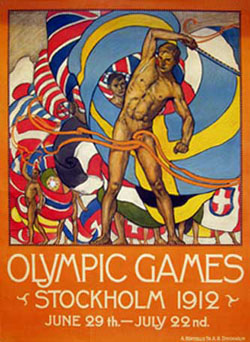
You can guarantee that unlike in London, the Swedish flag was definitely on display during the 1912 opening ceremony, as Stockholm became the first Scandinavian country to host the summer games.
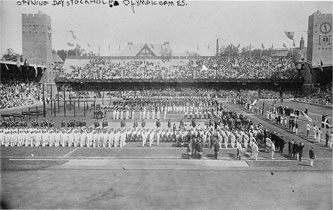
These were the last games to be held before the onset of World War I, and as far as I can tell they seem to have been the first to pass with little or no controversy. However, they were sadly marked by the first death of an Olympic athlete during competition, as Portugal's Francisco Lázaro succumbed to heat exhaustion during the marathon.
Next...
In the next part of this series I'll be looking at the controversy and dissent surrounding the Olympics during the inter-war years, leading up to the 1936 Nazi Olympics in Berlin.